 |
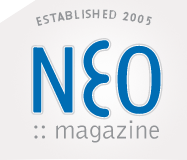
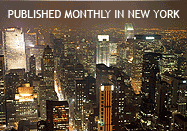
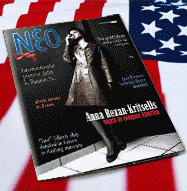





|
 |
Two Archbishops and a Rabbi on Religion
 |
  |
Rabbi Arthur Schneier, the senior rabbi at New York's Park East Synagogue, has joined a very distinguished group, including Archbishop Iakovos, President Jimmy Carter, President George H.W. Bush, former Soviet leader Mikhail Gorbachev, Archbishop Desmond Tutu, Mother Teresa, Elie Wiesel and Archbishop Demetrios after becoming the 23rd recipient of the Athenagoras Human Rights Award of the Order of St. Andrew the Apostle, Archons of the Ecumenical Patriarchate in America.
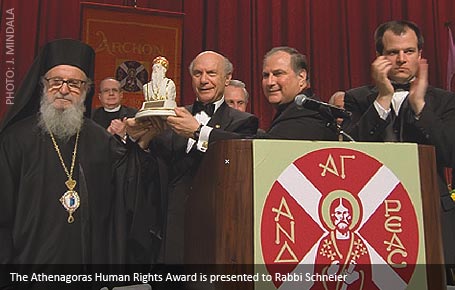
The award was presented to Rabbi Schneier at the Grand Banquet of the Order's annual three-day assembly, held in New York last October. The Rabbi was honored for his work as founder and president of the Appeal of Conscience Foundation, an interfaith organization of corporate and spiritual leaders from all faiths committed to promote peace, tolerance, and ethnic conflict resolution.
Ecumenical Patriarch Bartholomew and Rabbi Schneier have worked closely together as co-chairs of the 1994 Peace and Tolerance Conference in Constantinople/Istanbul, which strove to bring an end to the bloodshed in Yugoslavia. In 2005, they co-chaired the second Peace and Tolerance Conference, bringing together leaders from all the major faiths promoting peace and tolerance in Southern Europe and Central Asia.
After the award ceremony Rabbi Schneier and Archbishop Demetrios of America shared some thoughts to NEO. |
|
“Religion is like fire.
It can bring
comfort, but it can also destroy”
Rabbi Schneier |
|
Rabbi, you said in your acceptance speech that in time of crisis people turn to religion.
What the economic crisis has shown is that we don’t live in a divided world, that there are no borders, we are all in the same boat and basically what the Bible tells us is that we are all God’s children. Now, each one of us has the capacity to use the God-given potential for good or for destruction. In the past, we had many religious conflicts, because religion is like fire. It can warm, it can bring comfort, but it can also destroy. Fortunately, people have seen that some religious leaders today are not part of the problem but part of a solution for coexistence and dialogue. And that is a hopeful development.
As a Holocaust survivor, you have experienced the worst case of religious persecution and intolerance in human history. Yet just 60 years after the Holocaust, similar, even of lesser magnitude, phenomena have occured. Haven’t we learned the lesson yet?
As I pointed out, this is a time for heightened intolerance. And although we’ve had globalization, the identity of individual cultures is really threatened. So you have heightened nationalism and I don’t care for the word tolerance, because when you say tolerance, you tolerate. I believe in mutual acceptance, I respect you, I want you to respect me, I accept you, I want you to accept me. So, yes, unfortunately we have seen in Europe the rise of xenophobia and anti-Semitism. Again, the tendency of the human being is not to assume responsibility. You find radical Islam going back to Moses, bringing up things of the past. But we must not be paralyzed by the past, we must move forward. I could have been totally paralyzed by the pain of my losses, but thank God, I decided to use my energy help improve this world. So, that’s the challenge each religious leader faces. |
|
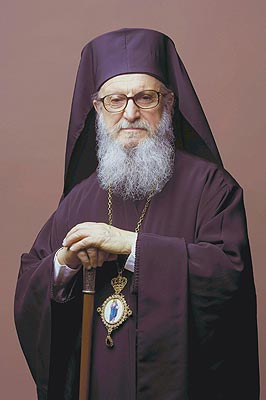 Archbishop Demetrios of America: Archbishop Demetrios of America:
“The world condition calls for
a much stronger action
on the
part of Orthodoxy”
|
| |
One of the institutions that face this kind of persecution and harassment is the Ecumenical Patriarchate. You have worked with the Patriarch in promoting religious dialogue and understanding.
He is an example of the capacity of a religious leader who understands the important teaching that we are all God’s children. His love and his outreach have earned him the respect and admiration throughout the world. That’s why I love the man; I admire him and respect him. He’s really an inspiration.
Judaism and Hellenism came together and fused--actually Christianity is the result of that fusion. Nowadays, do you see there two ancients traditions coming together to do other good things?
Yes, because basically, our core values are the same. I am an Orthodox rabbi, and I already have the affinity to the Orthodox (he laughs.) But you find the basic teaching of family, of education of children and so forth, is so similar. Even, I would say, our emotional feelings, Greeks are full of heart and emotion. So are Jews.
Archbishop Demetrios of America: “The world condition calls for a much stronger action on the part of Orthodoxy”
Tonight the American Greek Orthodox Church honored an Orthodox rabbi. What are some of the symbolisms and messages in your opinion?
This was a very nice occasion, something indicative of the spirit of openness that characterizes Orthodoxy. Orthodoxy is receiving every good thing that we could have. And we are conscious that Christianity is a continuation and a transformation of Judaic religion, therefore there is and there always will be a connection. After all, the Old Testament is a book used completely in the Church together with the New Testament, which shows the continuity. Tonight we had this very auspicious occasion by honoring someone who is really honoring this tradition of ours, by working in many instances closely with the Ecumenical Patriarchate. Rabbi Schneier has been instrumental in promoting issues of the Patriarchate with the religious, the diplomatic and political communities. So, there was a symbolism tonight, not only of openness but also of the value that is inherent in whatever good in any given religion and in any given religious person.
You just returned from the journey walking in the footsteps of Saint Paul in Asia Minor, modern day Turkey. What is your feeling in terms of the Orthodox people working together, not just being “spiritually united?”
This was again an event of paramount significance. It was not the first time the leaders of Orthodox churches under the present Ecumenical Patriarch have met. But this time there is a special significance because of some existing difficulties between the leadership of some Orthodox churches. And because of the world condition that calls for a much stronger action on the part of Orthodoxy. I was there from the very beginning I had the responsibility for the academic part, which followed the Synaxis (meetings). It was in my opinion, one of the most beautiful expressions of Orthodox unity. Now, the consequence of this meeting in terms of practical unity in action, I think time will show that it was serious.
What we saw in the Russian-Georgian conflict, a war among two ancient Orthodox Catholic peoples, the church could neither prevent nor effectively mediate for a solution. Did the hierarchs discuss the possibility of establishing a mechanism to be more effective should the need arise in the future?
The issue is almost exclusively political it’s not a religious conflict. On the other hand, I have to tell you that in the Synaxis we agreed on a statement of 14 points and there is a mentioning of the conflict there, because the issue was brought to the attention of the leaders. It has been included as an issue that was painfully recognized, but was positively recognized in doing anything possible to avoid a recurrence of things like that in the future and we asked both sides to be able to proceed correctly in terms of the political procedure, because the ecclesiastical procedure, as we have been told, was undertook from both sides.
|
|
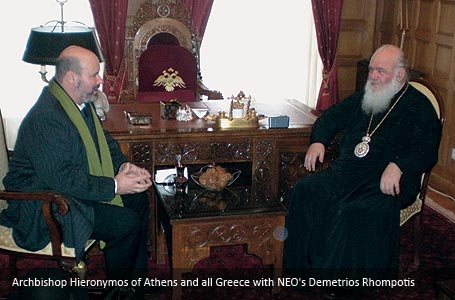
Demetrios Rhompotis recently had an audience with Archbishop of Athens and All Greece Hieronymos. One of the most erudite and spiritually capable hierarchs in today’s Orthodoxy, Hieronymos resumed his current duties about a year ago, promising to focus his efforts in turning the Greek Church to more substantial work, both on the spiritual and practical levels. At the end of the meeting, His Beatitude agreed to briefly speak on the record, in his only second interview since becoming Archbishop.
As other religious leaders have pointed out, in time of crisis such as the one we are going through now, people turn to religion.
There have always been crises in the course of history. At the same time, there have existed ways to overcome these crises. It’s true that in times of hardship, people turn to God more often than in time of prosperity and well being in order to find comfort and inspiration. But crises don’t get surpassed unless each one of us tries to do his part, for himself and the society in general.
What about the danger of fundamentalism?
When Orthodoxy is lived as an ecclesiastical experience and man lives within the spirit of Orthodox life and ways, there is no danger to become a fundamentalist or a fanatic in any sense of the word. Instead, he is looking for ways to strengthen himself in order to help the others. Orthodoxy is the Faith par excellence that stresses the belief that man shares the world with other people. That is what our faith in the Holy Trinity signifies: a society based on love. Thus, a Christian cannot see the “other” as enemy, but as a brother. Throughout the Orthodox teachings and beliefs I can’t really see any danger that they might lead to fundamentalism, only when there are aberrations. Unfortunately, countless crimes have been committed in the name of Jesus Christ.
Are you planning to visit us any time soon?
I’ve been to the US three times. I would wish to be able to come again, but it’s very difficult at this point due to my heavy schedule. We’ll see. |
 |
|
|
| ©2008 NEOCORP MEDIA |
|
 |
 |
|
|









|